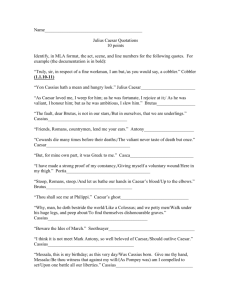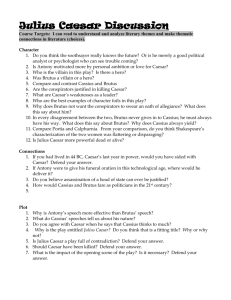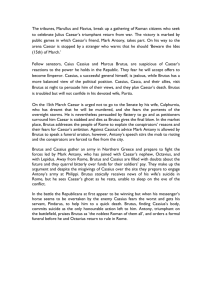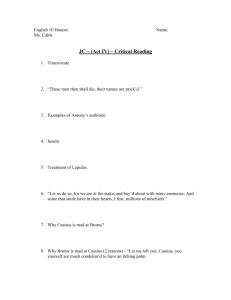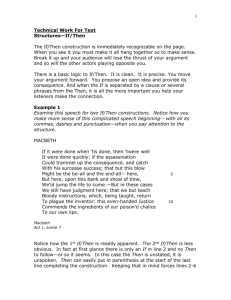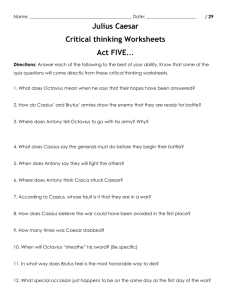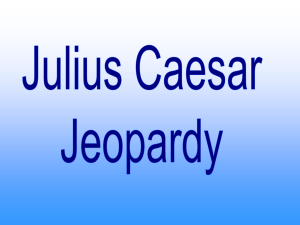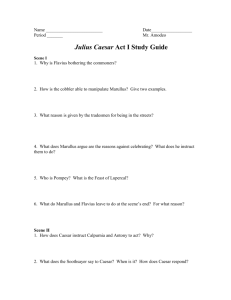complete
advertisement
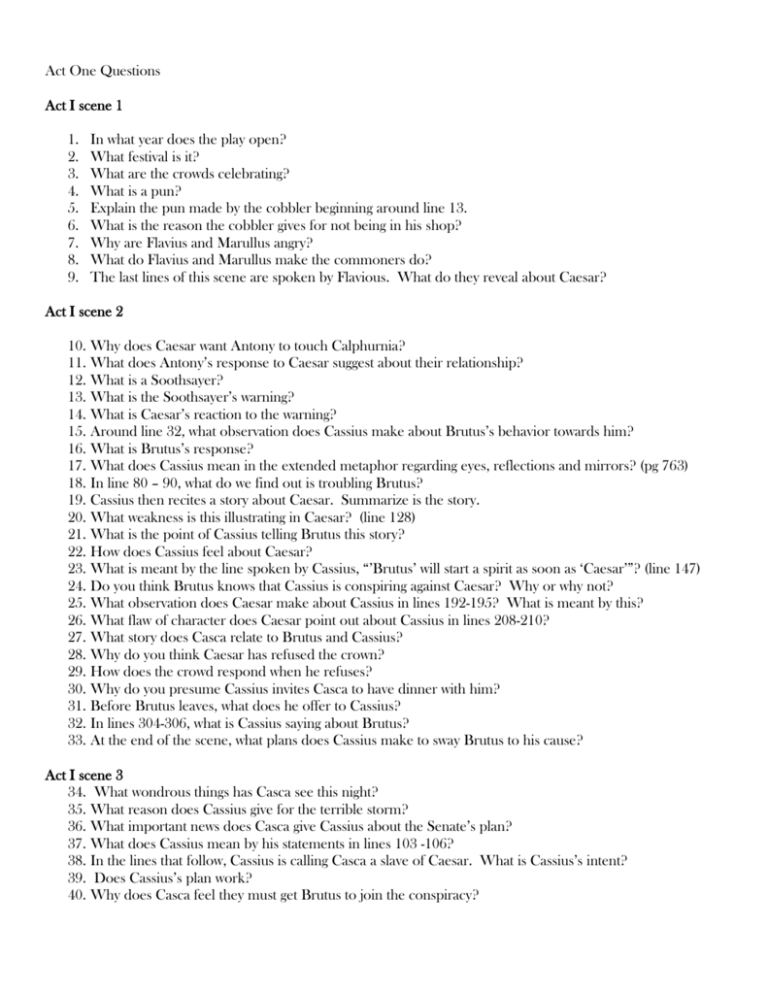
Act One Questions Act I scene 1 1. 2. 3. 4. 5. 6. 7. 8. 9. In what year does the play open? What festival is it? What are the crowds celebrating? What is a pun? Explain the pun made by the cobbler beginning around line 13. What is the reason the cobbler gives for not being in his shop? Why are Flavius and Marullus angry? What do Flavius and Marullus make the commoners do? The last lines of this scene are spoken by Flavious. What do they reveal about Caesar? Act I scene 2 10. Why does Caesar want Antony to touch Calphurnia? 11. What does Antony’s response to Caesar suggest about their relationship? 12. What is a Soothsayer? 13. What is the Soothsayer’s warning? 14. What is Caesar’s reaction to the warning? 15. Around line 32, what observation does Cassius make about Brutus’s behavior towards him? 16. What is Brutus’s response? 17. What does Cassius mean in the extended metaphor regarding eyes, reflections and mirrors? (pg 763) 18. In line 80 – 90, what do we find out is troubling Brutus? 19. Cassius then recites a story about Caesar. Summarize is the story. 20. What weakness is this illustrating in Caesar? (line 128) 21. What is the point of Cassius telling Brutus this story? 22. How does Cassius feel about Caesar? 23. What is meant by the line spoken by Cassius, “’Brutus’ will start a spirit as soon as ‘Caesar’”? (line 147) 24. Do you think Brutus knows that Cassius is conspiring against Caesar? Why or why not? 25. What observation does Caesar make about Cassius in lines 192-195? What is meant by this? 26. What flaw of character does Caesar point out about Cassius in lines 208-210? 27. What story does Casca relate to Brutus and Cassius? 28. Why do you think Caesar has refused the crown? 29. How does the crowd respond when he refuses? 30. Why do you presume Cassius invites Casca to have dinner with him? 31. Before Brutus leaves, what does he offer to Cassius? 32. In lines 304-306, what is Cassius saying about Brutus? 33. At the end of the scene, what plans does Cassius make to sway Brutus to his cause? Act I scene 3 34. What wondrous things has Casca see this night? 35. What reason does Cassius give for the terrible storm? 36. What important news does Casca give Cassius about the Senate’s plan? 37. What does Cassius mean by his statements in lines 103 -106? 38. In the lines that follow, Cassius is calling Casca a slave of Caesar. What is Cassius’s intent? 39. Does Cassius’s plan work? 40. Why does Casca feel they must get Brutus to join the conspiracy? ACT II, SCENE I. 1. What question is Brutus pondering at the opening of the scene? 2. For what information does Brutus want Lucius to look at a calendar? What is the significance of what Lucius finds? 3. Why do the conspirators want Cicero to join them? 4. Why does Brutus reject Cicero? What is Cassius's reaction and what does this show about his and Brutus's relationship? 5. What do the conspirators plan to do the next day? 6. How does Decius say he will make sure that Caesar will come to the Capitol? 7. What has Portia done to show Brutus that she is worthy of knowing his secrets? ACT II, SCENE II. 8. The stage notes say that there is thunder and lightening. What mood does this create? 9. So far, most of what we know of Caesar we know from what others have said about him. What flaws in his character are evident from his statements? 10. What strange and horrible things does Calphurnia report to Caesar that have been seen that night? 11. What does Calphurnia mean by the following statement? “When beggars die, there are no comets seen;/The heavens themselves blaze forth the death of princes.”(30-31) 12. Explain the metaphor that Caesar uses to describe himself in lines 41-48. What do you think his tone is as he gives this speech? 13. How does Decius convince Caesar to go to the Capitol? 14. In Act I, Cicero said that “men may construe things after their own fashion.” How does the discussion of Calphurnia’s dream illustrate this statement? 15. Why do you think Caesar decides to go to the Capitol? Support your answer. 16. All of the conspirators show up at Caesar’s home. How does Caesar respond to them and what does this show about his knowledge of the complications presented in the rising action? 17. Caesar tells the men to stand near him at the Senate House. What is ironic about Trebonius’s aside (line 124 – 125)? 18. Explain the meaning of Brutus’s aside (line 128 – 129). ACT II, SCENE III. 19. What is Artemidorus's plan? ACT II, SCENE IV. 20. Brutus had promised in Scene I to tell Portia later what was bothering him and why visitors had come to their house in the middle of the night. Do you think that he has told her or do you think she simply is worried that he may be sick? What clues do we have in the text? 21. Contrast how Portia appears in Scene 1 with how she appears in this scene. 22. Why is Portia so nervous and upset? On what errand does she send Lucius? 23. What feelings does Portia reveal in her soliloquy at the end of Scene 4? Act 3 scene 1 1. A new character, Popilius, has a brief statement. What is his line and what might it mean? 2. Compare how Brutus and Cassius react to Popilius. How does Brutus determine he is not a threat to the plan? 3. Why does Trebonius move Antony out of the way? 4. What is Metellus Cimber’s petition to Caesar? What is Caesar’s response and what tragic flaw does he display? 5. “Et tu Brute” is a famous line from Julius Caesar. What is the literal English translation? What is the deeper meaning and under what circumstances might someone say that quote today? 6. What do the conspirators do that was foreshadowed in Calphurnia’s dream? 7. At this point, are the conspirators feeling any regret? Paraphrase what Cassius and Brutus say in lines 111 – 116 that reveal their feelings. 8. What does Antony’s servant ask of Brutus? 9. This scene provides characterization of Antony. How would you describe him – do you think Cassius may have some merit in his fears of Antony? 10. Does Antony appear to approve of the murder? 11. What does Antony ask of Brutus before the conspirators leave? 12. What different responses do Cassius and Brutus give? 13. What type of dialogue is Antony giving beginning at line 254? 14. What true feelings are now revealed and to whom is Antony speaking? 15. Why is the mention of Octavious Caesar important? Act 3, scene 2 1. Remind me again why the conspirators felt Caesar had to die…What does Brutus specifically say is the reason? 2. If, then, it would have been honorable to kill Caesar, is Brutus’ argument proven? 3. Is the crowd supporting Brutus? 4. Why is it a mistake for Brutus to leave and let Antony address the people? 5. How does Marc Antony attack Brutus’ reason for killing Caesar? 6. In Antony’s long monologue beginning at line 73, what is he trying to do by repeatedly calling Brutus an “honorable man.” 7. Explain how this is verbal irony. 8. What does Caesar leave in his will? 9. Whose argument does this support – Brutus’ or Antony’s? 10. What has Antony created out of the commoners? Act 3, scene 3 Cinna is the name of one of the conspirators. It is also the name of a different man who is a poet. 1. How are the Plebeians acting? 2. What does the attack on Cinna the poet symbolize? Act 4, scene 1 1. Who is ruling Rome now? 2. What is the Triumvirate doing in this scene? 3. Why do they want Caesar’s will? Why is this ironic? 4. How does Antony feel about Lepidus? 5. What changes have you noticed in Antony? 6. What do we learn Cassius and Brutus have done? Act 4, Scene 2 1. What is going on between Brutus and Cassius? 2. Why do Brutus and Cassius go into the tent? Act 4, Scene 3 *Stoicism: a philosophy dating back to 300 b.c. in which you control or repress painful or pleasurable emotion to be free from grief or joy. 1. What wrong has Cassius accused Brutus of? 2. What does Brutus accuse Cassius of? 3. What does Cassius “urge” he will do if Brutus keeps it up? 4. What is Brutus mad at Cassius about in lines 69-71? 5. What is ironic about Brutus’s statement, “For I can raise no money by vile means” (line 71)? 6. Cassius denies the accusation, then feels he has been wronged by Brutus for picking out all his faults. What does Cassius tell Brutus to do? 7. What do we find out about Portia, Brutus’s wife? 8. Compare how Brutus and Cassius feel when talking about Portia? Who seems more emotional? 9. What news does Messala bring? 10. What is Cassius’s battle strategy? 11. What is Brutus’? 12. Whose idea prevails? 13. What does Caesar’s ghost represent? 14. What does Caesar’s ghost foreshadow? 15. How does Brutus’s desire to speed up the trip and battle at Philippi contribute to the falling action? Julius Caesar Act 5 The Resolution Act V, scene 1 1. What “hope” of Octavious and Antony is answered? What does this say about Brutus? (opening lines of Act V, scene 1) 2. What is Cassius referring to in the following statement? “Flatterers! Now Brutus, thank yourself; This tongue had not offended so today, If Cassius might have ruled.” (lines 45-47) 3. What sign has Cassius seen and how does it make him feel about the upcoming battle? (lines 80 – 89) 4. How does Brutus feel about suicide? 5. What will happen to the losing armies? 6. How do Cassius and Brutus leave their relationship as they go into battle? Scene 3 1. In Cassius’s opening line, who are the cowards he is referring to and why? 2. What mistakes do Brutus and Cassius in the battle against Antony and Octavious? 3. What is Titinius’s response to this? 4. Why is it ironic that it is Cassius’s birthday? 5. Who thinks he sees Titinius overtaken? 6. What does this cause Cassius to do? 7. Why does Titinius think Cassius killed himself? What does this cause Titinius to do? 8. Why is it powerful that Cassius (line 45) and Brutus (line 94) make cries to Julius Caesar? Scene 4 1. What does Lucilis do for Antony? 2. What happens to Lucilius? Scene 5 1. What request does Brutus make to some of his men? 2. Explain Brutus’s dying words (lines 50 – 51). 3. What does Octavious say to Brutus’s men? How does this help resolve the play? 4. What do Antony and Octavious’s last words say about Brutus? Power of Persuasion: Evaluating Cassius’s Claim Copy the Graphic Organizer onto you own paper. Using what you have learned about the power of persuasion, complete the graphic organizer to evaluate Cassius’ persuasive techniques. Cassius’ Claim: Logical Appeals Type Example Emotional Appeals Type Example Determination: Explain why you believe Cassius is or is not providing a convincing argument. Power of Persuasion: Evaluating Brutus’ and Marc Antony’s Claims Copy the Graphic Organizer onto you own paper. Using what you have learned about the power of persuasion, complete the graphic organizer to evaluate Brutus’ and Antony’s persuasive techniques. Brutus’ Claim: Logical Appeals Type Example Emotional Appeals Type Example Marc Antony’s Claim: Logical Appeals Type Example Emotional Appeals Type Example *Now, complete question 13 on page 832 in two paragraphs. In your first paragraph, address the first question while supporting your views. In the second paragraph, explain whose speech is more powerful while supporting your views. Analyzing Cause and Effect Copy the graphic organizer onto you own paper. Then, determine five important events or results in the play so far. Analyze what factors or circumstances have led to these effects. Causes Effects Figurative Language in Act IV Remember, figurative language is language that has more than surface meaning and is not understood at the literal level. Examples of figurative language are simile, metaphor, and personification. Directions: Reread the following excerpts from Act IV to see how Shakespeare uses figurative language. You may need to read the previous lines to remember the context of the dialogue. Passages: 1. Scene 2, ll. 23-24 2. Scene 3, l. 67 3. Scene 3, ll. 100-101 4. Scene 3, l. 158 For each: a. determine what kind of figurative language is used b. state what image is brought to mind c. explain the deeper meaning – what is Shakespeare really saying?

